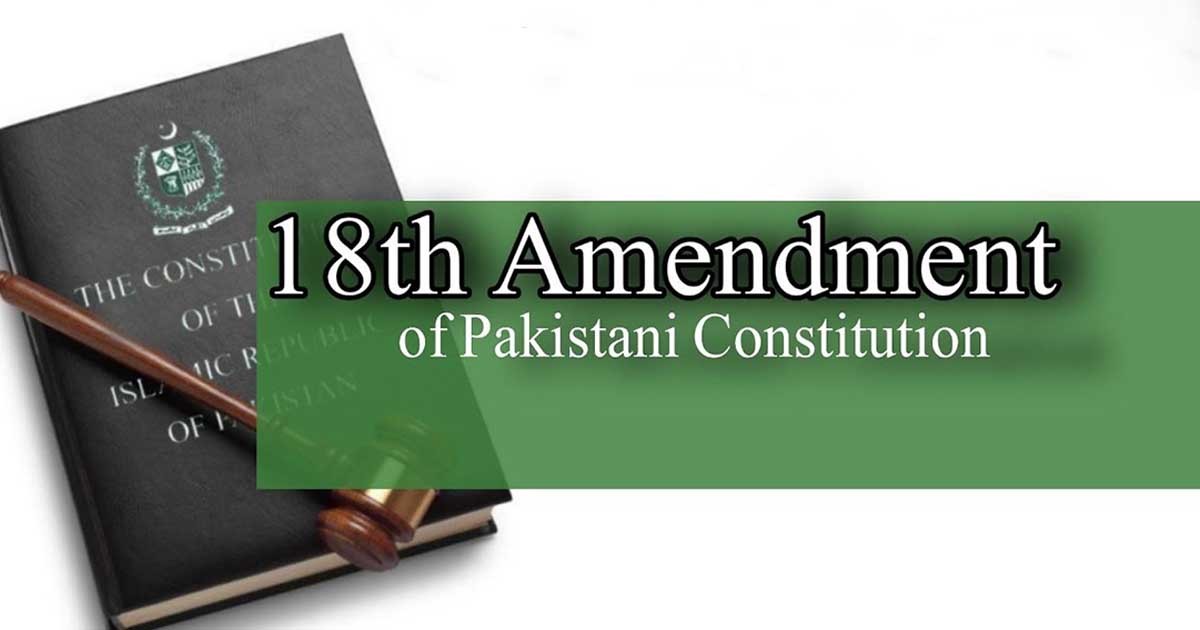Hafeez Ahmed Khan
The 18th Amendment to the Constitution of Pakistan is a landmark legislation that has brought significant changes to the country’s legislative, fiscal, administrative, political and federal aspects. According to the critics, the 18th Amendment has implemented the spirit of the federal parliamentary governance system in Pakistan’s constitution. However, the fundamental question is the implementation of the 18th Amendment. Despite its legislation, there still has been stiff resistance against the 18th amendment from the centralists, the establishment, bureaucracy and other federally imposed structures on provinces. Irrespective of the criticism or its varied implementation, the amendment is vital for the federal parliamentary governance in Pakistan.
The 18th Amendment strengthened the legislative powers of the parliament and the provinces by abolishing the concurrent list of subjects previously under the joint jurisdiction of the federal and provincial governments. This has given the provinces more autonomy and authority to legislate on matters such as education, health, environment, labour, social welfare, etc. The Amendment has also restored the parliamentary form of government by removing the president’s power to dissolve the parliament unilaterally and transferring it to the prime minister through a vote of no confidence. The Amendment has also introduced a new article that guarantees the right to free and compulsory education for all children aged five to sixteen years. The Amendment has also repealed the 17th Amendment that was imposed by General Musharraf’s government and undermined the parliament’s role. The Amendment has also made some changes to the composition and functioning of the Council of Common Interests (CCI), a constitutional body dealing with inter-provincial matters. The Amendment has increased the representation of the provinces in the CCI, made it mandatory for the CCI to meet at least once in 90 days, and given it more powers to resolve disputes between the federation and the provinces.
The 18th Amendment has enhanced the fiscal autonomy and resources of the provinces by increasing their share in the federal divisible pool of taxes from 47.5% to 57.5%. The Amendment has also given the provinces more control over their own revenues by allowing them to collect sales tax on services, excise duty on certain goods, and capital value tax on immovable property. The Amendment has also established a National Finance Commission (NFC) Award every five years, which determines the formula for distributing the federal taxes among the provinces based on multiple criteria such as population, poverty, revenue generation, etc. The Amendment has also created a Federal Consolidated Fund and a Provincial Consolidated Fund, which are separate accounts for all revenues and expenditures of the federal and provincial governments, respectively. The Amendment has also made it mandatory for the federal government to provide grants-in-aid to the provinces to meet their budgetary deficits.
The 18th Amendment has reformed the administrative structure and functions of the federal and provincial governments by abolishing or transferring several ministries, divisions, departments, and institutions from the federal to the provincial level. This has reduced the size and scope of the federal government and increased the responsibilities and capacities of the provincial governments. The Amendment has also introduced a new article that requires each province to establish a local government system within its territory. The Amendment has also empowered the provinces to appoint their own chief election commissioner, chief justice, auditor general, advocate general, ombudsman, etc. The Amendment has also given more autonomy and protection to key constitutional institutions such as the judiciary, the election commission, the Public Service Commission, etc., by making their appointments more transparent and independent from executive interference.
The 18th Amendment has improved political stability and democracy in Pakistan by removing the threat of military coups and presidential interventions that had plagued the country’s history. The Amendment has also increased the representation and participation of various political parties, regions, and groups in the national and provincial assemblies by introducing a proportional representation system for the Senate elections, reserving seats for women and minorities, and lowering the minimum age for voting and contesting elections from 21 to 18 years. The Amendment has also enhanced the accountability and transparency of the political system by introducing a new article that requires the prime minister and other ministers to declare their assets and liabilities annually and by making the parliamentary committees more effective and inclusive.
The 18th Amendment has transformed the federal system of Pakistan from a highly centralized and unitary one to a more balanced and cooperative one. The Amendment has recognized the diversity and pluralism of Pakistan’s society by changing the name of North West Frontier Province to Khyber Pakhtunkhwa, which reflects its ethnic identity, and by granting self-governance rights to Gilgit-Baltistan, which is a disputed territory with India. The Amendment has also addressed some of the grievances and demands of smaller provinces such as Balochistan, Sindh, and Punjab by increasing their share in the federal resources, devolving more powers to them, and ensuring their representation in the federal institutions2 The Amendment has also fostered a spirit of mutual trust and cooperation among the federation and the provinces by strengthening the role and functions of the CCI, the NFC, and the Inter-Provincial Coordination Committee.
However, the fundamental question arises about the implementation of the 18th Amendment. It deals explicitly with the devolution of power from federation to provinces. Then, the legislative and fiscal forms of federalism are implemented; however, the administrative side of federalism is yet to be implemented as a centralized bureaucracy is running Pakistan. Therefore, legislative, fiscal and administrative alignment is compulsory. Furthermore, the comprehensive legislation of the 18th Amendment requires the ownership of all concerned and political parties so that all bottlenecks and obstructions may be removed against its implementation, especially that of propaganda. It makes Pakistan a federal parliamentary constitution that is critical for federalism, good governance and the safety of the federation of Pakistan.
Please, subscribe to the official website of republicpolicy.com
















